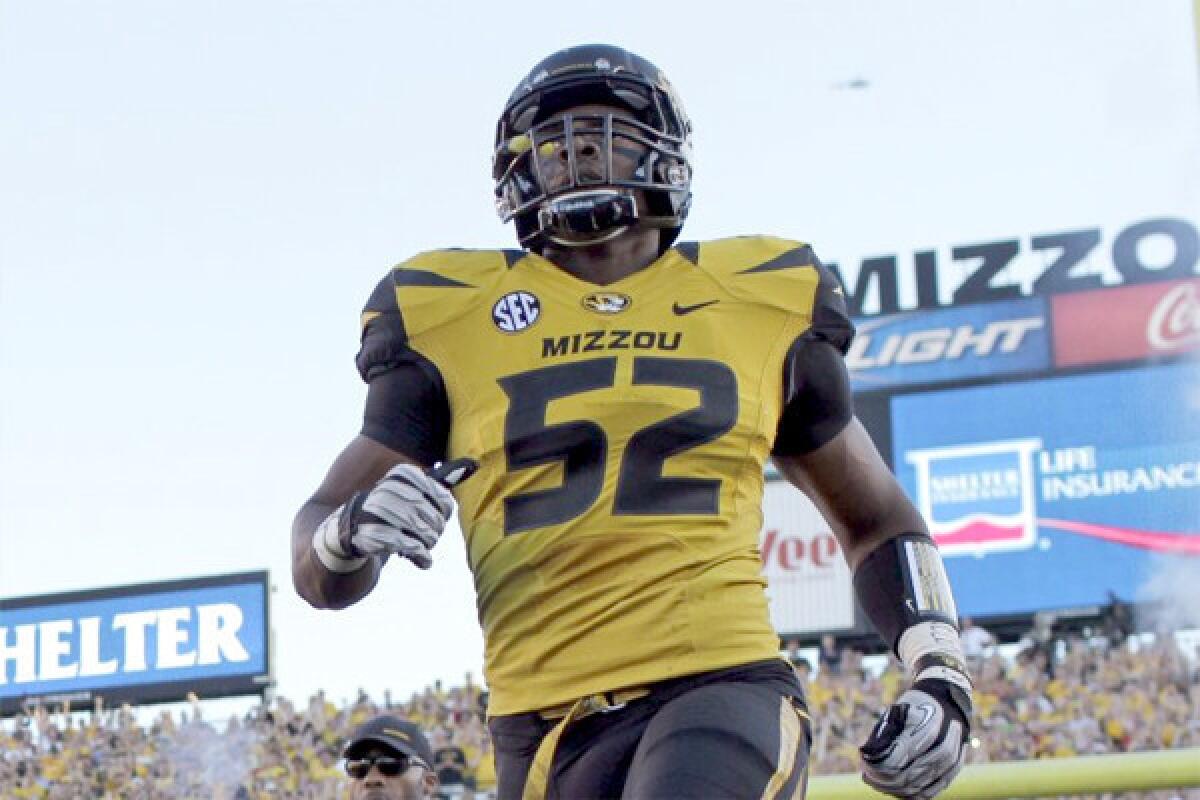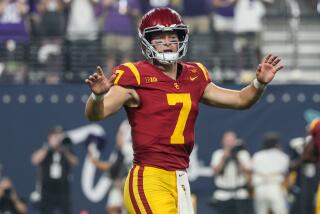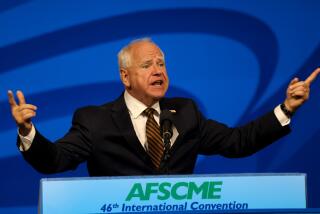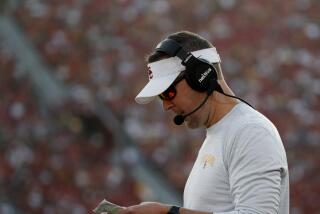Missouri’s reaction to Michael Sam’s announcement busted myths

COLUMBIA, Mo. — Craig Kuligowski heard the words, but at first they didn’t register.
In nearly three decades in college football, the University of Missouri defensive line coach had come to view summer team-building sessions as a typically uneventful training camp exercise. So he wasn’t expecting different on a sweltering day last August when he gathered 15 players in a nondescript, windowless meeting room on the first floor of the Mizzou Athletic Training Complex.
There, beneath seven black-and-gold placards professing an adherence to teamwork, camaraderie and character, one of the players tested whether those were core values or just empty words.
“I’m Michael Sam, a defensive end,” the player said. “I’m gay.”
Just like that, one of the toughest players on one of the toughest teams in the toughest conference in college football outed himself to his position coach and teammates.
That kind of revelation, it had long been assumed, might have apocalyptic consequences in a football locker room where bravado and homophobic slurs can be commonplace.
The reaction that day: “Everybody’s like, ‘Oh well, there you go’,” Kuligowski recalled Tuesday while sitting in the same room under the same placards.
Over the next weeks and months, Sam’s decision to come out united the locker room rather than divided it. Instead of turning their backs, his teammates let him know they had his back — and a team that had won only two conference games the previous season advanced to the conference championship game, defeated Oklahoma State in the Cotton Bowl and finished 12-2.
Sam, a starter but not a star in most of Missouri’s 2012 games, elevated his play to become the Southeastern Conference’s defensive player of the year and a first-team All-American. His teammates voted him Missouri’s most valuable player.
“This is probably one of the issues that united them,” Kuligowski said of Sam’s pronouncement. “Our guys, they got into a protective mode of where if somebody said something bad about him, they’re going to have to face all of us. He’s part of our family and we love him and we accept him as he is.”
But it didn’t have to turn out that way.
“It could have been a very huge distraction to our team,” the coach said. “No question.”
::
Even before Sam’s announcement , the vending-machine-sized lineman’s sexual orientation was a poorly kept secret.
The fifth-year senior had quietly come out to two teammates a year earlier. And even before Sam told more of the team, a reporter had approached associate athletic director Chad Moller with a question about an unnamed gay football player.
Sam, 24, didn’t try too hard to hide his homosexuality but hadn’t spoken publicly about it until ESPN and the New York Times published articles on Sunday. Sam was not available to be interviewed for this article.
“He wasn’t ashamed of it, but he didn’t want to necessarily bring all the attention to him,” said Kuligowski, who recruited him to Missouri. “He didn’t talk about it, so nobody else talked about it.”
Indeed, none of Missouri’s 127 football players discussed the issue in any detail outside the locker room. Nor, for that matter, did the local media pry, allowing Sam to make the announcement in his own time.
“A lot of people knew, but nobody really cared that much,” said Tyler J. Adolphson, a senior communications major from St. Louis. “I overheard it being casually mentioned at several bars on game days, but everyone’s reaction was always the same: ‘Oh well, he’s having a hell of a season.’ ”
Pat Ivey, Missouri’s strength and conditioning coach, also heard the rumors. For three years Ivey has held diversity seminars for the school’s athletes, and last April he broadened his session by including the You Can Play project, a campaign to protect opportunities for athletes regardless of their sexual orientation.
Afterward, Ivey said, Sam congratulated him on the talk and, before walking away, looked the coach in the eyes and said, “I know I can play.”
If the seminar gave Sam added confidence, there were still divisions within the team. Some players — a small minority — approached Ivey and criticized his message of inclusion for gays.
“Then there were other football players who said, ‘Well, my aunt, my cousin, my sister, my brother are part of that community. I treat them with respect and there’s certain words you won’t use around me,’ ” Ivey recalled. “There was education.”
Four months later, when Sam came out in the team-building session, he barely paused before going on to talk about his family and his childhood in southeastern Texas in which three of his seven siblings died and two went to prison, Kuligowski said.
The part about being gay? That, the coach said, was all but ignored.
“He said it like it’s understood,” Kuligowski said.
The coach’s reaction: “Well, I guess the question is now erased. Now we know.”
One other thing became clear soon after: Sam was playing football at a level rarely seen. He recorded 11 1/2 sacks and 19 tackles for losses to become only the second unanimous All-America pick in Missouri history.
“It was not a coincidence that Michael had, by far, his best season after coming out,” said Cyd Zeigler, co-founder and editor of the gay website Outsports. “I hear from athletes over and over again that they feel their performance improved when this weight was lifted off their shoulders. And they were just more comfortable around their team.
“The fact that he was accepted by his team so lovingly seems to be a surprise to everybody. It’s just not a surprise to me. Because it falls in line with every other coming-out story in high school, college, the pros and Olympic level in every sport everywhere across the country.”
::
If coming out was a big step for Sam, the next one may be even bigger.
Later this month, he is scheduled to participate in the NFL combine in Indianapolis, hoping to improve his standing. Some scouts consider him too small, at 6 feet 2 and 260 pounds, to play defensive end in pro football, and that he lacks the skill set to move to linebacker. Others like his quickness and strength. As a result, Sam could go as high as the third round in May’s NFL draft — or he could drop off the board completely.
“The story really isn’t going to be told until he’s drafted,” Zeigler said. “All we’ve gotten is the prologue so far. That’s why I think this story is going to be the biggest sports story of the year. Every month there’s going to be another important chapter added to it.”
Sam received wide-ranging congratulations and support after his announcement — even President Obama weighed in — but although many of his teammates quickly tweeted praise for him Sunday, they have now mostly gone quiet.
“Congrats @MichaelSam52 for making your announcement. I support you and wish you luck in life and in the NFL,” junior Kony Ealy, who played beside Sam, tweeted Sunday. But on Tuesday, Ealy’s agent, Andy Ross, said his client was too busy training for the combine to talk about Sam.
“Proud of my bro Mike for finally coming out,” senior linebacker Donovan Bonner tweeted Sunday. He did not return repeated messages left on his cellphone.
Whether Sam’s story continues to resonate depends on how he performs on the football field.
When aging free-agent basketball center Jason Collins came out last spring, it also was front-page news. But 10 months later, he remains unemployed and has probably played his last NBA game. When the Galaxy signed former U.S. national team midfielder Robbie Rogers in May, his first game drew a national TV audience. But Rogers played just one full match, did not score a goal, and is now fighting to keep his job.
One thing that makes Sam’s story different is that he came out to his teammates six months before doing so publicly. Then he shared a locker room with them while leading the Tigers to their second 12-win season in 112 years. So whether he makes it in the NFL or not, he has already succeeded in debunking the myth about gays in a male locker room.
“In an athletic environment — which we think those places are homophobic — nothing happened,” said Wade Davis, executive director of You Can Play and a former pro football player who came out after his career ended. “So I think that we need to look back and say, ‘Hmm, all these things that we’re worried about have already been proven false.”
For Ivey, that’s only part of the message. What Sam’s story proves to him is that being gay is no more an indicator of athletic prowess than being left-handed or a Republican or Presbyterian.
“I think there’s an assumption many people have made that if you’re gay, you’re weak. And what we learned, that’s not the case,” he said. “Gay is not weak. Gay is tough. Gay is strong. Gay is in your face. Gay is going up against the biggest player on the other team’s front line and beating him.
“That’s what gay is to us. Gay is standing up in front of your team and saying, ‘I’m gay.’
“That’s what we have seen. Not something weak, timid, something that’s going to be easily intimidated. That’s not Mike Sam.”
Twitter: @kbaxter11
More to Read
Go beyond the scoreboard
Get the latest on L.A.'s teams in the daily Sports Report newsletter.
You may occasionally receive promotional content from the Los Angeles Times.











